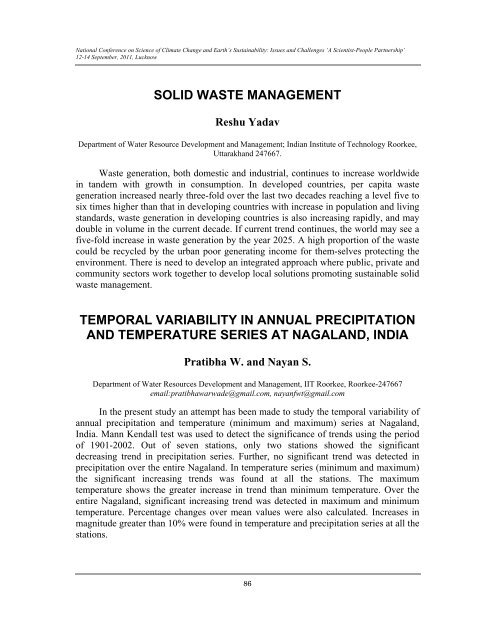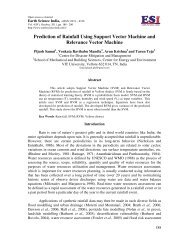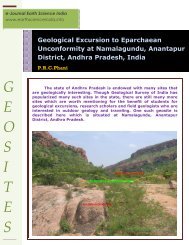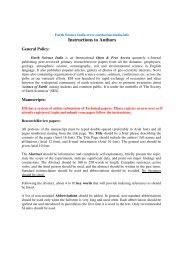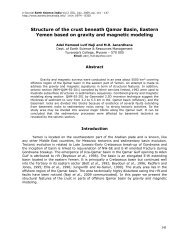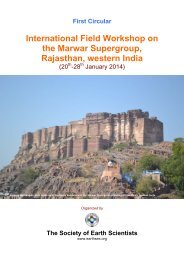12-14 September, 2011, Lucknow - Earth Science India
12-14 September, 2011, Lucknow - Earth Science India
12-14 September, 2011, Lucknow - Earth Science India
Create successful ePaper yourself
Turn your PDF publications into a flip-book with our unique Google optimized e-Paper software.
National Conference on <strong>Science</strong> of Climate Change and <strong>Earth</strong>’s Sustainability: Issues and Challenges ‘A Scientist-People Partnership’<br />
<strong>12</strong>-<strong>14</strong> <strong>September</strong>, <strong>2011</strong>, <strong>Lucknow</strong><br />
SOLID WASTE MANAGEMENT<br />
Reshu Yadav<br />
Department of Water Resource Development and Management; <strong>India</strong>n Institute of Technology Roorkee,<br />
Uttarakhand 247667.<br />
Waste generation, both domestic and industrial, continues to increase worldwide<br />
in tandem with growth in consumption. In developed countries, per capita waste<br />
generation increased nearly three-fold over the last two decades reaching a level five to<br />
six times higher than that in developing countries with increase in population and living<br />
standards, waste generation in developing countries is also increasing rapidly, and may<br />
double in volume in the current decade. If current trend continues, the world may see a<br />
five-fold increase in waste generation by the year 2025. A high proportion of the waste<br />
could be recycled by the urban poor generating income for them-selves protecting the<br />
environment. There is need to develop an integrated approach where public, private and<br />
community sectors work together to develop local solutions promoting sustainable solid<br />
waste management.<br />
TEMPORAL VARIABILITY IN ANNUAL PRECIPITATION<br />
AND TEMPERATURE SERIES AT NAGALAND, INDIA<br />
Pratibha W. and Nayan S.<br />
Department of Water Resources Development and Management, IIT Roorkee, Roorkee-247667<br />
email:pratibhawarwade@gmail.com, nayanfwt@gmail.com<br />
In the present study an attempt has been made to study the temporal variability of<br />
annual precipitation and temperature (minimum and maximum) series at Nagaland,<br />
<strong>India</strong>. Mann Kendall test was used to detect the significance of trends using the period<br />
of 1901-2002. Out of seven stations, only two stations showed the significant<br />
decreasing trend in precipitation series. Further, no significant trend was detected in<br />
precipitation over the entire Nagaland. In temperature series (minimum and maximum)<br />
the significant increasing trends was found at all the stations. The maximum<br />
temperature shows the greater increase in trend than minimum temperature. Over the<br />
entire Nagaland, significant increasing trend was detected in maximum and minimum<br />
temperature. Percentage changes over mean values were also calculated. Increases in<br />
magnitude greater than 10% were found in temperature and precipitation series at all the<br />
stations.<br />
86


